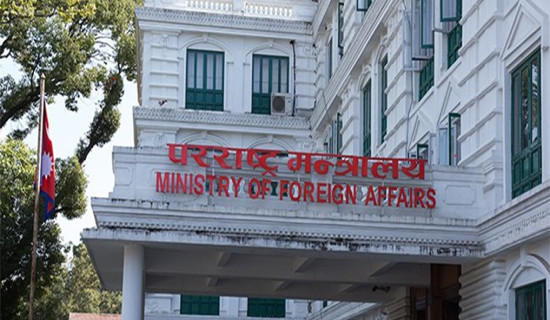- Wednesday, 4 March 2026
Meritocracy Still A Far Cry In TU ?
Last week, Tribhuvan University senators had a heated conversation with Chancellor and Prime Minister KP Sharma Oli about dean appointments that had remained pending for long. Oli raised the question of deans' absence from the TU Senate meeting and then directed Vice Chancellor Professor Keshar Jung Baral to guarantee that all deans from faculties and institutes would be appointed and would attend the next senate meeting on December 22.
Oli stressed the necessity of keeping TU free of politicisation and demanded that deans be appointed on a merit basis and underlined the significance of merit-based recruitment at TU, vowing to address the trouble created by political interference. To respond to the PM’s call, Vice Chancellor Baral on Sunday appointed eight deans and three directors to fill the positions that became vacant for months, but authorities at TU could not appoint them owing to divisive politics deeply rooted in the nation’s oldest university.
Inefficiencies
With inefficiencies once again shown by the delays in naming deans, it resulted in key positions being held by interim officials for months and two others nearing term expiry. PM Oli stressed that the government would not meddle in dean appointments and asked all concerned to ensure the fair appointment of deans and directors. Vice Chancellor Baral also indicated that he delayed selecting the deans to ensure that the appointments were fair and based on merit. Such delays jeopardised the institution's capacity to function adequately and fuelled public distrust in the country's oldest university, which has served as a backbone of higher education for decades.
TU's unsatisfactory situation in its academic and administrative operations, an outcome of the entrenched politicisation of the institution, often led to recruitments based on the political affiliation of TU professionals. This situation has caused many meritorious professionals to remain on the margins, while less able people get attractive positions. Despite previous pledges of reform and meritocracy, the process remains mired in political meddling, casting a lengthy shadow on the institution's capacity to serve as Nepal's leading academic body.
Reports suggest that despite a clarion call for meritocracy in appointments, all eight deans that were appointed on Sunday carried out based on political sharing. Though the deans appointed have not openly stated their loyalties to any parties, three professors appointed as deans are said to be close to the Nepali Congress and two each are said to be close to the CPN-UML and Maoist Centre. Only one new dean is said to be an independent one.
Decades of political intervention have only harmed the essential ideals of academic achievement and equitable governance. Vice Chancellor Keshar Jung Baral, who was appointed during the tenure of former Prime Minister Pushpa Kamal Dahal Prachanda, has faced accusations of favouritism from both the government and opposition parties. His initiatives to promote merit in choosing deans have led to frustration, notably among student unions linked with politics.
Skilled lecturers and professors have been discouraged and prevented from taking on leadership roles in several faculties and organisations affiliated with the university due to political meddling. As in many areas of the country, political affiliation of TU professionals frequently takes precedence over skill and qualification, and as a result, talented, independent hands are excluded, perpetuating a cycle of mediocrity.
Successive governments in the past have utilised the university to promote their youth cadres and student wings. With appointments serving to reward supporters, officials, including vice chancellors, deans, and directors at four organisations, are frequently selected depending on their political party loyalty at the oldest university. It is often the case that when a party wins control of the government, it assigns a loyalist to the TU as vice chancellor, who then assists other loyalists in being nominated as deans, registrars, and department chairs. This ingrained culture has made it difficult for the university to attract imaginative leadership capable of guiding it towards global academic standards.
Vice Chancellor Baral highlighted inherent problems arising from a politicised institution. Parties are hesitant to give up their control over the university. In fact, political parties locate cadres for their student and teacher organisations at the TU's Central Department, affiliate colleges, and campuses. Prime Minister Oli's speech at the latest TU Senate meeting emphasised the need for fairness and meritocracy in university governance. Avoiding excessive meddling and allowing university leaders to make autonomous, transparent decisions will be crucial steps towards rebuilding public trust.
Chancellor Baral's dedication to meritocracy is admirable, but he must exhibit transparency at all stages of the selection process. Involving stakeholders like academics, students, and policymakers in these choices can assist in fostering confidence and future collaboration. Allegations of prejudice in the selection process frequently mar the reputations of TU vice chancellors. As a result, they must embrace openness and accountability in the process of selecting senior deans and department leaders.
Collaborative commitment
Meanwhile, reforming TU demands collaborative commitment from all stakeholders rather than individual initiative. The government must prioritise thorough changes that avoid widespread political involvement in universities. Undoubtedly, appointment disputes at TU are linked to existing political party dynamics. The government is now run by the two major parties in parliament, the Nepali Congress and the UML, with the vice chancellor, Baral, appointed by the Prachanda-led government. The loyalists of two ruling parties have accused Baral of aligning with professionals who support him and the Maoist Centre, the party that helped him get the appointment.
Finally, despite TU dealing with its dean and organisation chief selection dilemma, restoring the credibility of the nation's oldest institution would necessitate the eradication of political favouritism, which has long existed here. The path ahead for TU stakeholders is surely difficult, but with uncompromising commitment to meritocracy, TU can become a beacon of academic excellence in Nepal.
(Upadhyay is a former managing editor of this daily)
















